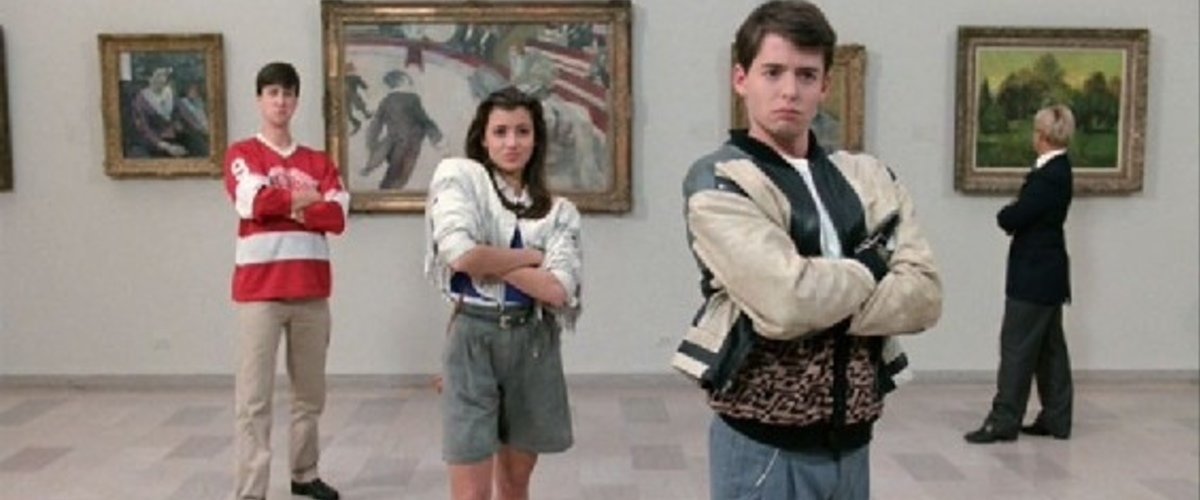The Hughes Corporation
John Hughes would have been 66 last week. For a decade or so, as a writer/director/producer, he burned about as brightly in the Hollywood firmament as anyone ever has. I recently read Kirk Honeycutt's John Hughes: A Life In Film, a book that tries to place his life and work in that context.
Hughes was raised in Grosse Pointe and Chicago, and though he moved to Hollywood, he never fully went Hollywood. His movies were about the Midwest, and so was he. As a young man he was a success in the advertising business, but much preferred writing humor. He became a contributor to National Lampoon in the late 70s, writing stories like "Vacation '58," vaguely based on memories of car trips with his parents.
Thanks to Animal House, National Lampoon became a big name in the film business, and Hughes quickly became a superstar screenwriter with two hits in 1983, Mr. Mom and National Lampoon's Vacation, the latter based on his short story. He was enough in demand that he was allowed to direct his next film, Sixteen Candles (1984), which was a minor hit that helped establish him as king of the teenage films.
Hughes was in his early 30s, but he still remembered what it was like to be a kid. He didn't write down to teenagers, and they responded. If anything, he glamorized them, building up their actions and emotions while making adults look stupid or uncaring. This was even truer in his next film, The Breakfast Club, where five high school students are stuck in detention, and form bonds--mostly by realizing it's all their parents' fault.
Hughes worked with the cast and allowed a lot of improvisation. In fact, he shot so much film on his projects you'd think he was making an epic. And though the studio didn't think much of the concept of The Breakfast Club, it made pretty good money, and it seemed like Hughes could do no wrong.
He continued making teen films, directing Weird Science and (his masterpiece) Ferris Bueller's Day Off, while also writing/producing other films such as Pretty In Pink and Some Kind Of Wonderful. He was known for how quickly he wrote, generally churning out his scripts in less than a week. Except that was the first draft--all through casting, shooting, even editing, he'd be rewriting. (Also, no matter how serious he got, he gave the audience what it wanted, especially happy endings--he might have thought Andie should end up with Duckie, but if the public wanted her to get Blane, she got Blane.)
He was closing in on 40 and didn't want to be known as just the teen king, so the next few films he directed starred adults--Planes, Trains And Automobiles, She's Having A Baby and Uncle Buck. Then came Curly Sue--the only film he directed in the 90s--which he thought was so bad that he pretty much gave up directing rather than put himself on the line again.
More important, while he'd had hits before, in 1990, he was involved in a blockbuster--Home Alone. He wrote it, produced it and chose Chris Columbus to direct. Warner Brothers had rejected the script, saying Hughes had to cut the budget by a million because the returns on a film starring a child are limited, so he took it to Fox. It became the biggest hit comedy of all time.
Hughes was as big as he could get, but now he seemed stuck making films starring kids--Dennis The Menace and Baby's Day Out, to name two fairly big budget items that disappointed. He got the best deals he'd ever had, but he was never associated with another blockbuster (unless you count Home Alone 2). For that matter, his films rarely had the quality of his 80s work.
He moved back to Chicago and spent more time with his family. He was essentially retired--and looking at his later films, this was probably just as well. He died of a heart attack in 2009.
Honeycutt lays it out pretty clearly. The writing is only serviceable, but I like, for a coffee table book, that he notes the weaknesses of the films as well as the strengths. And he also notes that Hughes had problems. He could be mercurial, for instance, hiring directors and then firing them just before the shoot began. He could hold grudges, shutting out old friends, not talking to them for years.
Hughes' films weren't nominated for Academy Awards--that's not the kind of stuff he made. But he left behind a legacy that will be remembered more than a lot of Oscar winners'.




0 Comments:
Post a Comment
<< Home